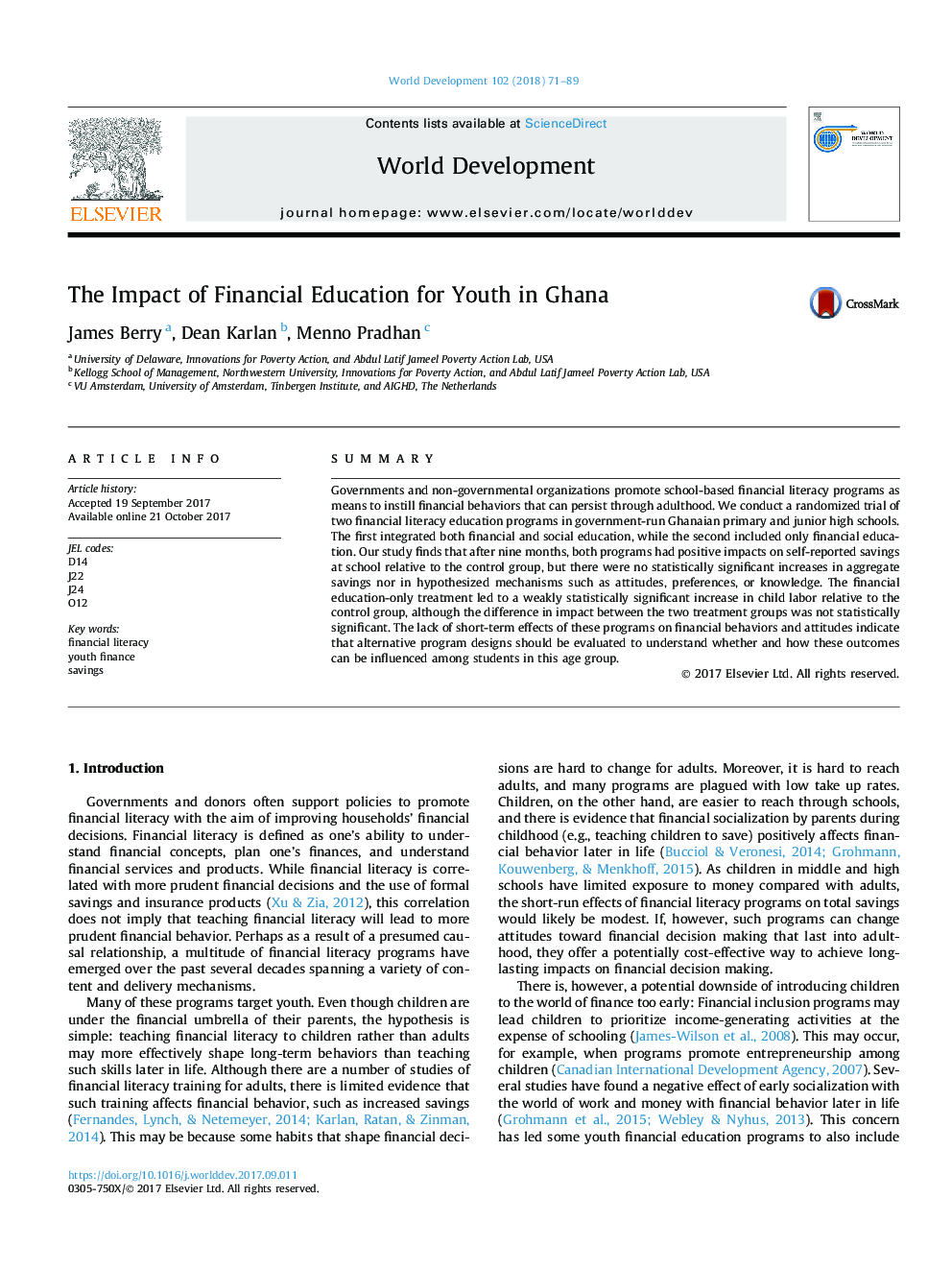| کد مقاله | کد نشریه | سال انتشار | مقاله انگلیسی | نسخه تمام متن |
|---|---|---|---|---|
| 7392285 | 1481116 | 2018 | 19 صفحه PDF | دانلود رایگان |
عنوان انگلیسی مقاله ISI
The Impact of Financial Education for Youth in Ghana
ترجمه فارسی عنوان
تأثیر آموزش مالی برای جوانان در غنا
دانلود مقاله + سفارش ترجمه
دانلود مقاله ISI انگلیسی
رایگان برای ایرانیان
ترجمه چکیده
دولت ها و سازمان های غیردولتی برنامه های سواد مالی مالی مبتنی بر مدرسه را به عنوان وسیله ای برای پرورش رفتارهای مالی که می توانند از طریق بزرگسالی ادامه یابد، ارتقاء می دهند. ما یک آزمایش تصادفی دو برنامه آموزش سواد مالی در مقاطع ابتدایی و متوسطه دولتی غنا را انجام می دهیم. اولین هم آموزش مالی و اجتماعی را در بر داشت، در حالی که دوم تنها آموزش مالی بود. تحقیقات ما نشان می دهد که پس از نه ماه، هر دو برنامه تأثیر مثبتی بر صرفه جویی در گزارش خود در مدرسه نسبت به گروه کنترل داشته اند، اما افزایش قابل ملاحظه ای در پس انداز کلی و یا مکانیسم های فرض شده مانند نگرش، ترجیحات و یا دانش وجود ندارد. درمان تنها آموزش مالی منجر به افزایش ضعیف آماری قابل توجه در کار کودکان در مقایسه با گروه کنترل شد، اگر چه تفاوت در تاثیر بین دو گروه درمان به طور آماری از نظر آماری معنی دار نبود. فقدان اثرات کوتاه مدت این برنامه ها بر رفتار و نگرش های مالی نشان می دهد که طرح های برنامه جایگزینی باید مورد سنجش قرار گیرد تا بدانند که آیا این نتایج می تواند در بین دانش آموزان این گروه سنی تأثیر داشته باشد یا خیر.
موضوعات مرتبط
علوم انسانی و اجتماعی
اقتصاد، اقتصادسنجی و امور مالی
اقتصاد و اقتصادسنجی
چکیده انگلیسی
Governments and non-governmental organizations promote school-based financial literacy programs as means to instill financial behaviors that can persist through adulthood. We conduct a randomized trial of two financial literacy education programs in government-run Ghanaian primary and junior high schools. The first integrated both financial and social education, while the second included only financial education. Our study finds that after nine months, both programs had positive impacts on self-reported savings at school relative to the control group, but there were no statistically significant increases in aggregate savings nor in hypothesized mechanisms such as attitudes, preferences, or knowledge. The financial education-only treatment led to a weakly statistically significant increase in child labor relative to the control group, although the difference in impact between the two treatment groups was not statistically significant. The lack of short-term effects of these programs on financial behaviors and attitudes indicate that alternative program designs should be evaluated to understand whether and how these outcomes can be influenced among students in this age group.
ناشر
Database: Elsevier - ScienceDirect (ساینس دایرکت)
Journal: World Development - Volume 102, February 2018, Pages 71-89
Journal: World Development - Volume 102, February 2018, Pages 71-89
نویسندگان
James Berry, Dean Karlan, Menno Pradhan,
